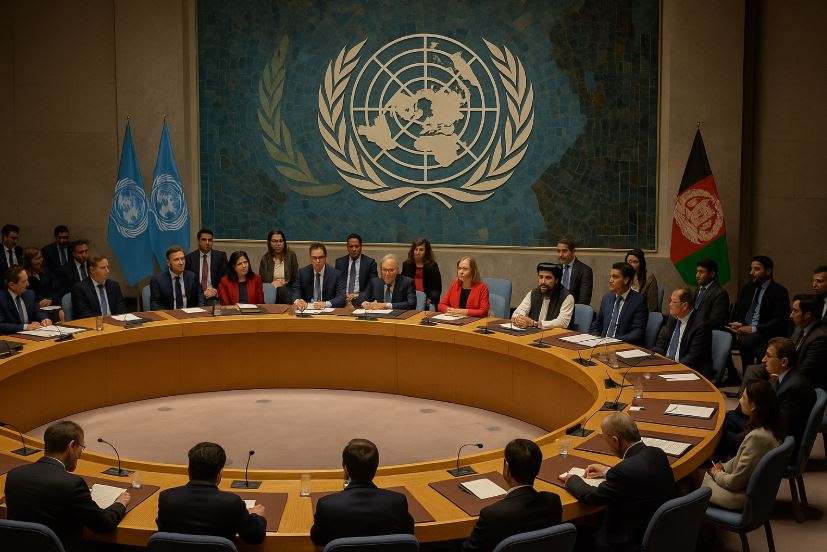Co-authored by Omar Samad (Amb.) and Dr. Mujib Abid
Last week, the United Nations introduced the MOSAIC plan at the Security Council session on Afghanistan. Officials and diplomats are now considering this new approach following months of consultations and offline briefings with a broad array of international stakeholders and some Afghans from inside and outside the country – representing the de facto authorities, civil society, private sector, advocacy groups and activists.
According to insiders, the initiative has faced mixed reviews. Some countries, human rights groups and activists in the diaspora say that the plan lacks “genuine inclusion” and risks “legitimizing” the Taliban as a de jure state entity.
The plan itself is a significant development, indeed, which plays out against a broader debate in the international community and amongst Afghans themselves as they reckon with the realities of post-Taliban Afghanistan. Soon it will be four years since the Taliban’s return to power in Afghanistan and yet, the international community and Afghans themselves seemingly remain trapped in a cycle that does not bode well for the people Afghanistan. It goes from the extreme binaries of condemnation or uncritical embrace, on the one hand, to disengagement and uncertainty, on the other.
But disengagement or uncertainty, ambiguous as they’re by their very nature, are not neutral acts – they create their own dynamics, shaping the course of conflict and prolonging humanitarian crisis and abject suffering in Afghanistan.
It is important to make some observations about engagement – the word “ta’aamol” has taken roots among Afghans as a stand in term. What is the politics of engagement? And with what type of a power?
Politics of Engagement
There are some promising new leads in recent scholarship that, in shedding light on the evolving nature of the Taliban, can prove productive (indicatively, see: Abid 2025; Zaland 2023; Abbas 2024). Abbas’s The Return of the Taliban (2024), the first book-length analysis of its kind, merits particular attention. He believes “Taliban 3.0” embody significant shifts from their earlier iterations. While still ideologically rigid, this new Taliban have been forced to adapt – shaped by their prolonged interaction with the West, exposure to international diplomacy, and the realities of governance. Their pragmatic approach in negotiating with regional powers and handling governance internally point to the possibility of transformation. This is not to say that fundamental change is assured, but it is important to recognize that there are spaces where engagement may encourage such shifts.
Abbas argues that engagement with the Taliban, when carefully calibrated, does not equate to endorsement but can be a means of leverage to promote human rights, inclusive governance, and the well-being of the Afghan people. Crucially, engagement can create incentives for change without legitimizing the regime. “Engagement,” he writes, “is not about endorsing their ideology, but about creating an environment where diplomacy and influence can work to bring about positive change” (Abbas 2024, p. 23).
From our conversations with the UN officials, it was apparent that a similar sentiment drives this shift in approach. They stress that “engagement seeks to address, not normalize restrictive, discriminatory policies.” Rosa Otunbayeva, the Secretary General’s Special Representative and UNAMA head, tried to allay concerns by pointing out to the MOSAIC’s practicality features. She told Council members that “the Comprehensive Approach involves working groups and a mosaic of key issues. I stress the approach does not seek to normalize the status quo, but rather ensure that multiple key issues of concern – in particular upholding the country’s international obligations – remain at the core of engagement efforts.”
Launched with caution by UNAMA, the MOSAIC approach represents an effort to adapt to the realities of the post-Taliban Afghanistan. It introduces a flexible, incremental process for engagement that emphasizes a variety of issue-specific working groups. Rather than trying to solve everything at once, MOSAIC focuses on areas where there is some common ground, such as economic reform, counter-narcotics, and regional stability.
The UN says the initiative is partly inspired by UNRes 2721, which took “positive note of the independent assessment on Afghanistan (document S/2023/856) and encouraged Member States and other relevant stakeholders to consider the implementation of its recommendations, especially in regards to increasing international engagement in a more coordinated manner.”
The MOSIAC Plan
The MOSAIC plan calls for talks and action on six key issues:
1. Creating and maintaining engagement modalities at all levels.
2. Supporting the formation of an inclusive government.
3. Advocating for the rights of women and all ethnic groups.
4. Phased easing of international sanctions.
5. Access to Afghanistan’s frozen central bank assets.
6. International reintegration and diplomatic status review.
Undoubtedly, for many countries stung by terrorism, security is also a priority consideration that is being addressed through various platforms.
Read More: Kabul & Washington: On same wavelength
Meanwhile, Qatar announced that it is “hosting the third meeting of the Counter-Narcotics Working Group and the second meeting of the Private Sector Working Group under the UN-led Doha process on Afghanistan, on June 30 to July 1”. Representatives from the de facto government, countries involved in the Doha process, and technical experts are expected to attend.
The plan was given a boost this week when Malaysian and Kyrgyz diplomats asked that the international community to focus on constructive engagement and stability in Afghanistan.
The plan is a critical step forward. It is not a panacea, but it is a start. The plan’s emphasis on phased engagement, inclusive governance, and human rights guarantees could offer Afghanistan a way out of its current crisis. The initiative’s flexibility allows room for iterative change, while its phased implementation creates measurable benchmarks. While this may seem modest, its incremental approach allows for the building of trust and momentum, creating the space for a broader dialogue on governance, rights, and reconciliation.
However, the narrative of engagement remains controversial, particularly among Afghan political elites in exile. For many, the idea of negotiating with the Taliban is seen as a betrayal – a fear not entirely unfounded given the pain of displacement and loss. Yet, these concerns can have a type of Totalising hold and, as such, come to drive the entire discourse. Afghan peace must be determined from within Afghanistan, with the voices of those on the frontlines – journalists, educators, civil society groups, and, importantly, women – as much as from without.
UN sources say they have been listening to the Afghans, whose reactions and feedback to the MOSAIC plan, perhaps expectedly so, remain disparate and variegated. It has included stakeholders who are supportive and shared their views on the path ahead and those who are cautiously supportive and have provided constructive revisions. It has also included those who have seen it but have not expressed any feedback and those who are critical and communicated their rejection of the plan with the UN. There are also those who may or may not have reviewed the plan but remain opposed, nonetheless.
Expecting rifts and differences of opinion, the new job could entail facilitation and mediation to resolve issues central and critical to the welfare of the Afghan people – the frontline victims of a semi isolated society going through a prolonged transitional phase.
Read More: Making sense of Mujahidin Victory Day celebrations in Afghanistan
The UN will need to constructively make use of its coordinating position to continue to consult and build consensus on improving the MOSAIC plan and come up with mechanisms that would solicit buy-in and support for subject-matter expertise and discussions that can, to the extent possible, be representative and inclusive.
Knowing that the plan is not a perfect and an all-encompassing recipe to address Afghanistan’s complex and longstanding challenges, it is, nonetheless, a signal and a step that despite rights restrictions, governance shortcomings and reduced aid and attention, there’s still bandwidth and interest to adopt a pragmatic approach using diplomacy and talks as effective tools. As history has shown, the alternative will prove to be detrimental to the wellbeing of the Afghan people. As these debates continue, Roger Fisher’s ethos lingers in the air: “We must not allow our stubborn attachments to the past to obstruct the goodness of tomorrow” (quoted in Abbas 2024, p. 23).
Dr. Mujib Abid is an Afghan-Australian scholar specializing in modern Afghan history, peace studies, and political theory. He currently serves as a Postdoctoral Research Fellow at the University of Melbourne.
Omar Samad is a Nonresident Senior Fellow at the Atlantic Council’s South Asia Center. He is also the founder and president of Silkroad Consulting, LLC.













